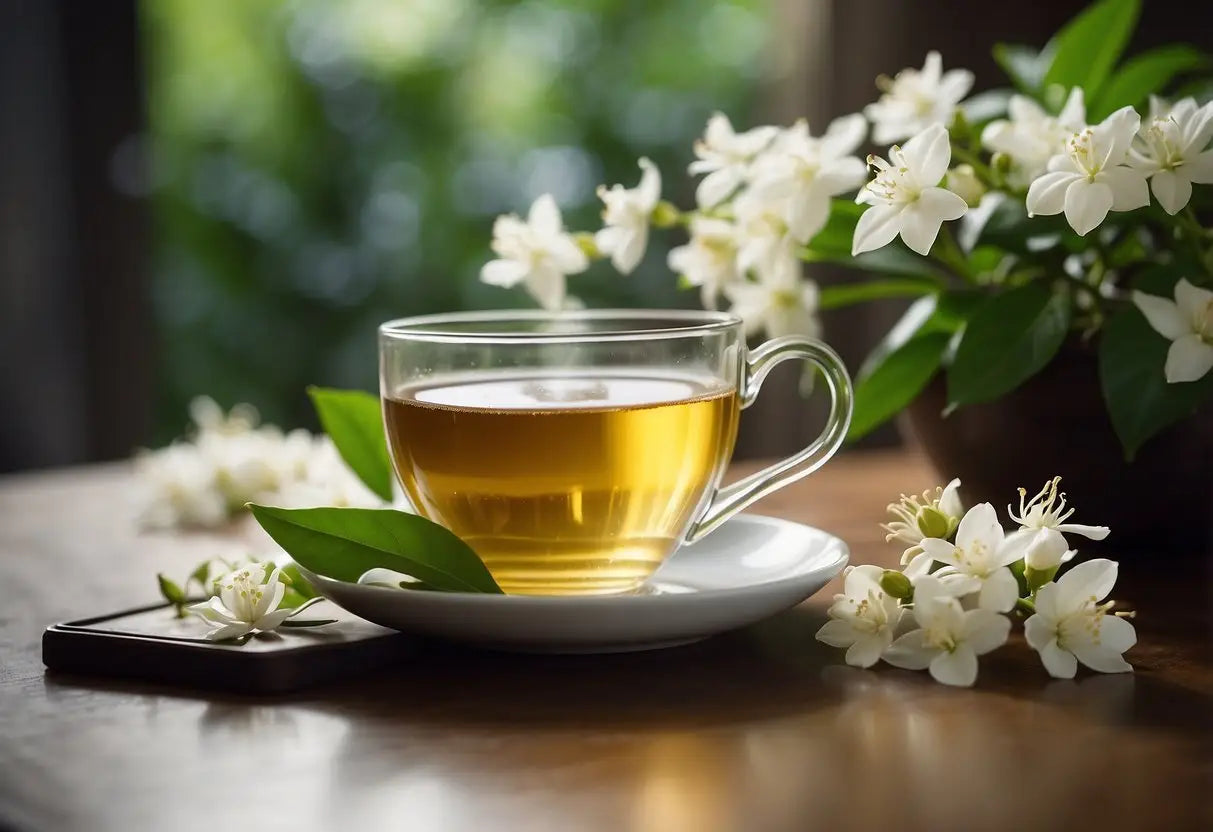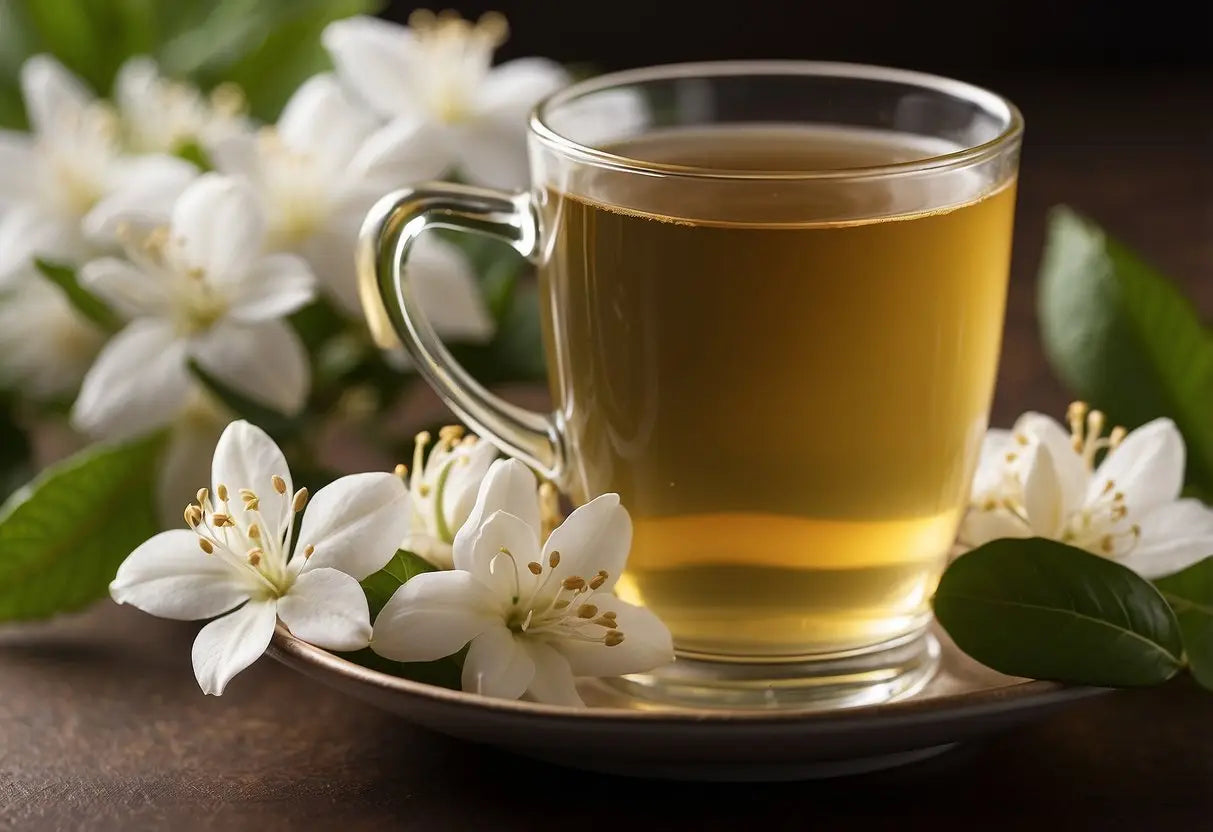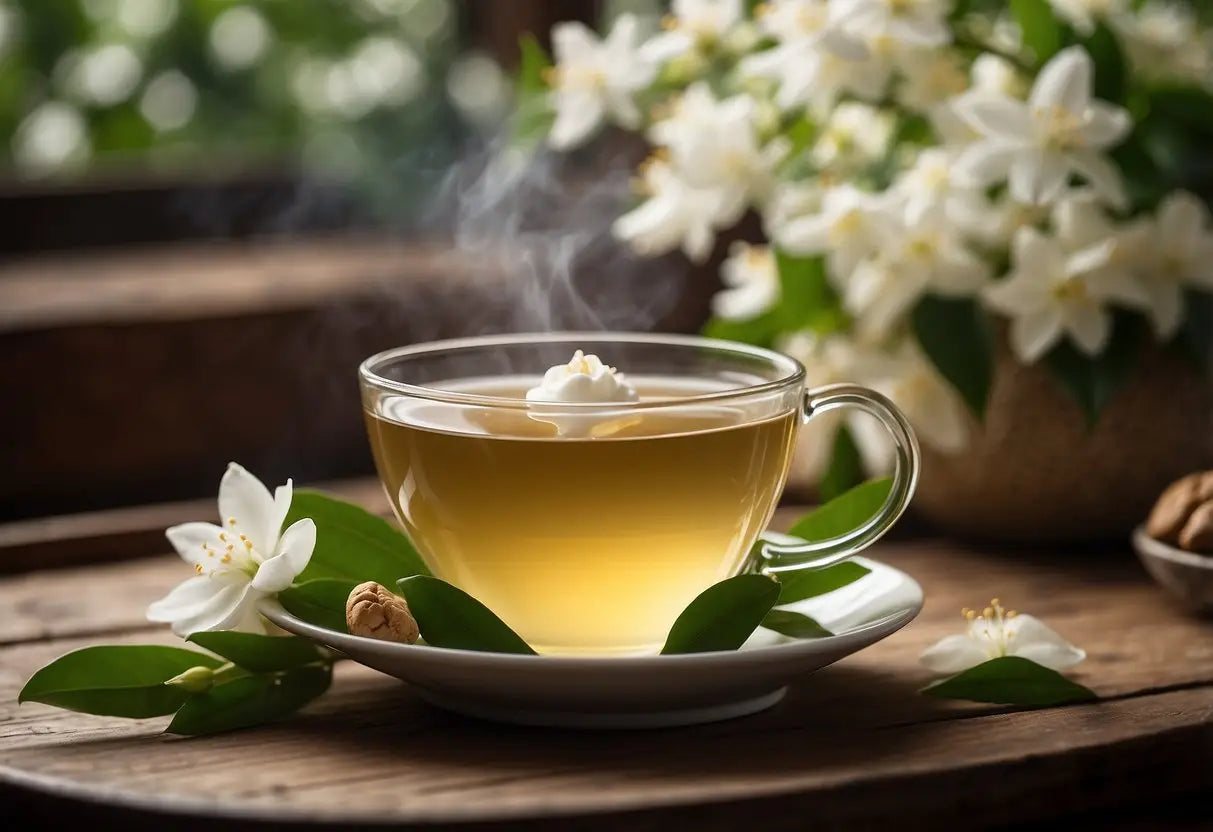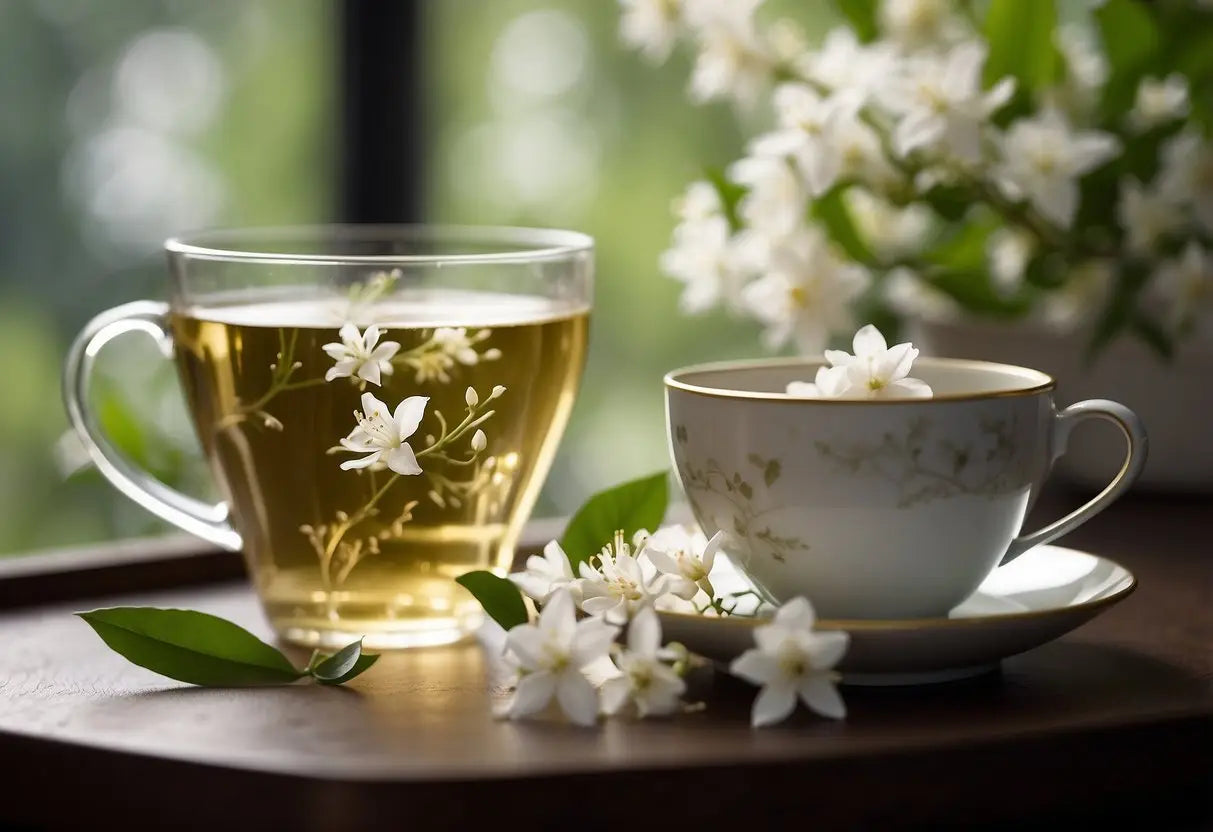Jasmine Tea Benefits
Jasmine tea is an aromatic infusion known for its delicate flavor and numerous benefits. This tea has a rich history, reflecting both cultural significance and traditional practices.
What Is Jasmine Tea?
Jasmine tea combines green tea leaves with jasmine flowers, creating a fragrant beverage. The tea leaves are typically harvested and dried before being blended with fresh jasmine blossoms. The scenting process involves layering the tea with flowers to absorb the aroma.
There are different quality grades, with some teas undergoing multiple scenting rounds for enhanced flavor. Jasmine tea can also include black or white tea bases, offering variations in taste and strength.
Bestsellers
Historical Significance
Jasmine tea originated in China and has been enjoyed for centuries. It gained popularity during the Ming Dynasty and was prized for its subtle fragrance. Historically, it was considered a luxury, often enjoyed by nobility.
Over time, jasmine tea became accessible to the general populace and remains a popular choice. Its cultural importance extends beyond China, influencing tea traditions in Japan and other parts of Asia.
Health Benefits

Jasmine tea provides a variety of health advantages rooted in its antioxidant properties, ability to alleviate stress and anxiety, improve cardiovascular health, support weight loss, reduce cancer risk, aid in digestion, and boost the immune system.
Antioxidant Properties
Jasmine tea is rich in antioxidants, especially catechins, which help combat free radicals. Consuming antioxidants can reduce cellular damage and age-related decline. Studies suggest that these properties may contribute to improved skin health and reduced risk of chronic diseases. Different varieties of jasmine tea may offer differing levels of these beneficial compounds.
Stress Reduction and Anxiety Management
Jasmine tea contains compounds that promote relaxation. The aroma of jasmine has been shown to have calming effects on the nervous system. Drinking jasmine tea can help reduce stress levels and improve mood. This makes it a useful addition to your evening routine or anytime you need relief from daily stressors.
Cardiovascular Health
Regular consumption of jasmine tea is linked to better heart health. The antioxidants in jasmine tea can lower LDL cholesterol levels and improve arterial function. These benefits help reduce the risk of heart disease and stroke. Ensuring a healthy cardiovascular system is essential for long-term well-being.
Weight Loss Support
Jasmine tea can be a helpful ally in weight management. Its catechins increase metabolic rate and enhance fat oxidation. Drinking jasmine tea before workouts or between meals could support your weight loss journey. Integrated into a balanced diet and exercise plan, it can make your efforts more effective.
Cancer Risk Reduction
Some studies indicate that the antioxidants in jasmine tea may reduce the risk of certain cancers. Catechins and polyphenols can inhibit the growth of cancerous cells. While no tea can guarantee cancer prevention, incorporating jasmine tea into your daily routine may provide some protective benefits.
Digestive Health
Jasmine tea may improve digestion by enhancing the growth of beneficial gut bacteria. Its anti-inflammatory properties can alleviate symptoms of gastrointestinal disorders like ulcers. Drinking jasmine tea after meals could aid in digestion and help maintain a healthy gut.
Immune System Boost
Regularly drinking jasmine tea can strengthen your immune system. The tea's anti-microbial and anti-inflammatory compounds help the body fight off pathogens more effectively. This can lead to fewer infections and quicker recovery times, making it easier for your body to stay healthy.
Preparation and Brewing Techniques
To prepare jasmine tea, start with high-quality tea leaves. Choose between loose leaves or tea bags, both offering unique flavors.
Lao Ban Zhang
Heat fresh water to around 175°F-185°F (80°C-85°C). Avoid boiling water as it can scorch the delicate leaves.
Use approximately 1 teaspoon of loose tea leaves per cup. This ensures an optimal balance of flavor and aroma.
Carefully pour the hot water over the tea leaves. Allow the tea to steep for 2-4 minutes depending on your taste preference.
Strain the tea leaves from the liquid. Serve immediately for the freshest experience.
Feel free to add enhancements like honey, lemon, or mint according to your taste. Be sure to experiment to find your perfect cup.
Different brewing vessels, such as teapots, gaiwans, and tea infusers, can affect the taste. Each method offers a slightly unique drinking experience.
Brewing Tips
- Pre-warm your cup or pot: This helps maintain the water temperature.
- Measure your tea: Consistency in measurement ensures consistent flavor.
- Monitor steeping time: Prolonged steeping can result in bitterness.
- Fresh water: Use filtered water for the purest taste.
By following these steps, you'll enjoy a beautifully brewed cup of jasmine tea.
Nutritional Profile

Jasmine tea offers a variety of beneficial nutrients, including a low caloric content and essential vitamins and minerals that contribute to overall health.
Caloric Content
Jasmine tea is typically low in calories, making it a popular choice for those mindful of their caloric intake. An 8-ounce serving of jasmine tea brewed without any added sweeteners usually contains less than 5 calories. This makes it an excellent beverage for maintaining a balanced diet without consuming unnecessary calories.
Consuming jasmine tea can support weight management due to its low calorie count. You can enjoy multiple cups throughout the day without significantly impacting your daily caloric intake.
Vitamins and Minerals
Jasmine tea is a source of several important vitamins and minerals, though not in high amounts. It contains small quantities of vitamin C, which is essential for immune system health, and vitamin A, beneficial for vision and skin health. Additionally, it offers trace amounts of minerals like potassium, calcium, and magnesium that support various bodily functions such as muscle contraction and bone health.
The antioxidant properties of jasmine tea, due in part to its vitamin content, help protect cells from damage. This can contribute to reducing the risk of chronic diseases and maintaining overall wellness.
Culinary Uses

Jasmine tea can be integrated into your cooking in various ways, adding a unique floral note to dishes.
1. Marinating: Use cooled jasmine tea as a base for marinades. It pairs well with meats like chicken or fish, enhancing the flavor with a subtle aroma.
2. Jasmine Rice: Replace water with brewed jasmine tea when cooking rice. This simple method infuses the grains with its signature fragrance.
3. Desserts: Incorporate jasmine tea into your desserts. Add it to sorbets, ice creams, or cakes, offering a refreshing twist.
4. Tea Blends: Blend jasmine tea with other teas to create unique flavors. Popular blends include jasmine green tea or jasmine black tea.
5. Scenting: Use jasmine tea leaves to scent your kitchen pantry or cupboards. The leaves emit a fragrant aroma that enhances the space.
Recipes using Jasmine Tea
| Recipe | Description |
|---|---|
| Jasmine Tea Sorbet | A light, refreshing dessert made using jasmine tea. |
| Jasmine Tea Chicken | Chicken marinated in a jasmine tea mixture before grilling. |
| Jasmine Rice Pudding | Traditional rice pudding infused with jasmine tea flavor. |
Explore these applications to discover how jasmine tea can elevate your culinary creations.
Selection and Storage
When selecting jasmine tea, prioritize quality. Look for whole, unbroken leaves that appear vibrant. Broken, dusty leaves can indicate lower quality.
Consider the aroma. High-quality jasmine tea emits a distinct, sweet floral scent. Avoid teas with artificial or overwhelming fragrances.
Check the packaging. Opt for airtight containers to prevent exposure to air and moisture, which can degrade the tea.
For storage, keep jasmine tea in a cool, dark place. Light and heat can negatively affect the tea’s flavor and aroma.
Use opaque containers. Transparent containers might look elegant but allow light to penetrate, deteriorating the tea’s quality.
Avoid storing tea near strong odors. Jasmine tea can absorb surrounding smells, altering its delicate fragrance.
If possible, refrigerate unused tea for long-term storage. Ensure it’s in an airtight container to prevent moisture and odor absorption. If refrigeration is not preferred, store in a dry, room-temperature environment.
Side Effects and Considerations

While jasmine tea offers numerous benefits, it's essential to be aware of potential side effects.
Possible Side Effects
Caffeine Content: Jasmine tea contains caffeine, which may cause insomnia, jitteriness, or increased heart rate if consumed excessively.
Allergic Reactions: Some individuals may experience allergic reactions such as skin rashes or respiratory issues.
Gastrointestinal Issues: Consuming large amounts can cause stomach upset or acid reflux.
Specific Considerations
-
Pregnancy and Breastfeeding: Moderate your intake, as caffeine can affect both the mother and baby.
-
Medications: Jasmine tea may interact with certain medications. Always consult your healthcare provider.
Usage Tips
- Portion Control: Stick to 2-3 cups per day to minimize risk.
- Organic Varieties: Choose organic to avoid pesticides and additives.
- Hydration: Balance tea consumption with sufficient water intake.
← Older post Newer post →











